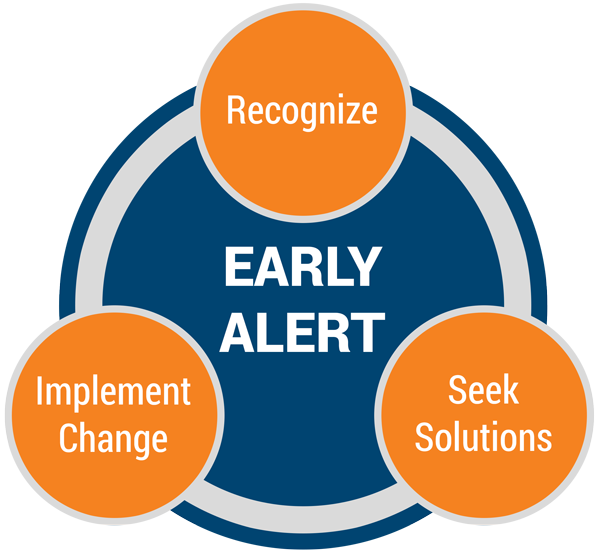|
 The TSC Academic Early Alert & Intervention Program allows faculty to identify students who need assistance because of poor academic performance, class participation, and/or attendance issues, and refer them to an Academic Advisor who can help the student access appropriate support systems. This type of intrusive advising has been demonstrated to be effective in increasing the retention and overall academic performance of a variety of high-risk students. The TSC Academic Early Alert & Intervention Program allows faculty to identify students who need assistance because of poor academic performance, class participation, and/or attendance issues, and refer them to an Academic Advisor who can help the student access appropriate support systems. This type of intrusive advising has been demonstrated to be effective in increasing the retention and overall academic performance of a variety of high-risk students.
Providing intervention assistance early in the semester is critical to student persistence and completion. The earlier an academically at-risk student is identified, the better the prognosis for success. Therefore, the program targets ALL students, not just freshmen or students in specific academic programs, during the initial 4 weeks of the fall and spring semesters.
Program goals:
- Increase student academic success
- Improve student persistence and completion rates
- Increase student utilization of student services
- Increase communication between students, faculty and academic advisors
- Identify and implement new and innovative strategies for student success
Course instructors should refer students for the following reasons:
- Poor class attendance
- Persistent tardiness
- Lack of engagement or participation in class
- Low test/quiz scores
- Missing, incomplete, or poorly completed homework assignments
- Other measures of academic performance
Recommendations: Academic Advising recommends to the TSC Faculty to:
- Set up appointments with your students periodically
- Update test grades, quizzes, mid-terms, and homework periodically. Students must know if they are passing with a minimum of “C”
- Utilize the Early Alert Program before the deadline for “W” courses. Student must take decisions towards “W”. Only six withdrawals are permitted on their transcripts.
Note: Both the course instructor and the advisor should explain that the referral does not mean the student will fail, nor will it be reflected on their academic transcript. The referral simply means that the instructor is concerned about certain specific issues that might be a roadblock to the student's success.
Step by step process
- Go to the TSC home page
- Click on the "MyTSC” tab on the right menu next to the rotating image and then select “TSC Online”
- Log in using your TSC faculty credentials (same as Pearson)
- On the Faculty Menu click on “Student Attendance/Early Alert Program”
- Select current Term and click submit
- Select appropriate course
- Select one referral reason to appropriate students and click submit. You can refer as many students as needed.
Important note: Before submitting the Early Alert Form, read guidelines below.
- The course instructor will notify the student that they are being referred to an advisor as part of the early alert program.
- The course instructor will notify the student that they should visit the Academic Center prior to the next class meeting.
- The student will be assigned to an academic advisor.
- The assigned advisor will then:
- Work with the student to develop an Individual Success Plan.
- If the student is a candidate for counseling session, the academic advisor will refer the student to Counseling Services with Ms. Ana Dunn. This visit finalizes the Early Alert Intervention Program.
- If the student is not a candidate for counseling session, the academic advisor will refer the student to the Workshop Series given by Angela Dunn.
- The instructor will be able to view the visits completed by student on the Faculty Menu click on” Student/Attendance/Early Alert Program
- If there is no response from the student within 5 business days, another email will be mailed out to the student as a second notice.
Note: The conversation with the advisor is meant to be a “wake-up” call. Together, student and advisor will identify the major sources of the student’s academic difficulties and will discuss options to address those difficulties. The result of the conversation will be the implementation of a success plan for the student.
|




 The TSC Academic Early Alert & Intervention Program allows faculty to identify students who need assistance because of poor academic performance, class participation, and/or attendance issues, and refer them to an Academic Advisor who can help the student access appropriate support systems. This type of intrusive advising has been demonstrated to be effective in increasing the retention and overall academic performance of a variety of high-risk students.
The TSC Academic Early Alert & Intervention Program allows faculty to identify students who need assistance because of poor academic performance, class participation, and/or attendance issues, and refer them to an Academic Advisor who can help the student access appropriate support systems. This type of intrusive advising has been demonstrated to be effective in increasing the retention and overall academic performance of a variety of high-risk students.